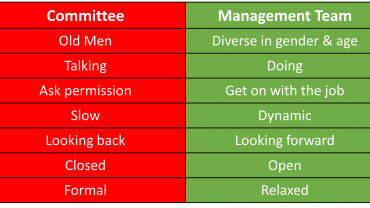
Anyone following recent parliamentary exchanges which directly resulted in the subsequent jockeying of the leader of the opposition outside government buildings, will be in no doubt as to the impact of chosen words and phrases. The corporate world will have taken note. As a leader, if you want to change or evolve a culture, pay close attention to language. The words you choose and the consistency with which you use them are so important.
When change is needed
Let me give you a simple example. I’ve recently completed a four-year stint as Chairman of my local cricket club. It’s a great club, with amazing facilities in an affluent area of the country. I’ve been a member for over 15 years now and still manage to play reasonably regularly in the fourth XI on a Saturday. While we cling onto four teams on a Saturday, Sunday cricket went some time ago. Community cricket as any fan will know, is struggling to keep pace with modern consumer preferences. The game simply takes too long to play. On top of the adverse social trends, four years ago, our club had got itself into a bit of a financial muddle. Volunteers in key roles had taken their eye of the ball, leadership was absent, and the club was effectively being run by paid contractors. Not necessarily in a bad way, but perhaps with a different set of priorities. Things needed to change.
Whilst the ‘why’ was obvious to most stakeholders, the ‘how’ was a different matter. And Cricket Clubs like some other traditional sports clubs, have many members that are resistant to change. They fear it. Most people do. And the language of change can feel uncomfortable. For example, changing the term for those that step up to manage the club from ‘committee’ to ‘management team’.
Language can symbolise change
Nevertheless, my new management team colleagues back in 2017 agreed that we should do this. Why? Hopefully the answer is an obvious one. If not, these questions will help: What mental picture do we build in our mind when we think about this word? How many people to we know that like the idea of joining a committee? Who looks forward to a committee meeting? How appealing is this language to the younger generation that you want to attract into active club development roles? Or to women of any age? What connections do we make between this word and the need to change?
The phrase ‘management team’, as illustrated below, carries much more positive connotations. It’s more progressive and it’s more modern. It’s active and future facing. It suggests that this is a team of people that is going to move the club forward. Which is exactly what we did. We filled the key roles with suitably skilled people and encouraged them to play to their strengths. It was a team that remained remarkably stable over the next four years. A team that worked together to turn the club around.

Does everyone in the club prefer the term ‘management team’. No. Some find it hard to get used to. For some it is unnecessary and for some, I suspect, ‘It’s just not cricket’. That’s fine, no one should be forced to use language they don’t like. But I’m very sure of one thing. Where running a sports club is concerned, ‘Management team’ is about the future and ‘Committee’ is the past.
Despite Covid, we (our club) emerged four years later with a transformed balance sheet, a more inclusive and welcoming culture, and a much better and broader understanding of how our club works. The full story has many more chapters, but the key point for now is this:
If you need to drive change, words really do matter.


